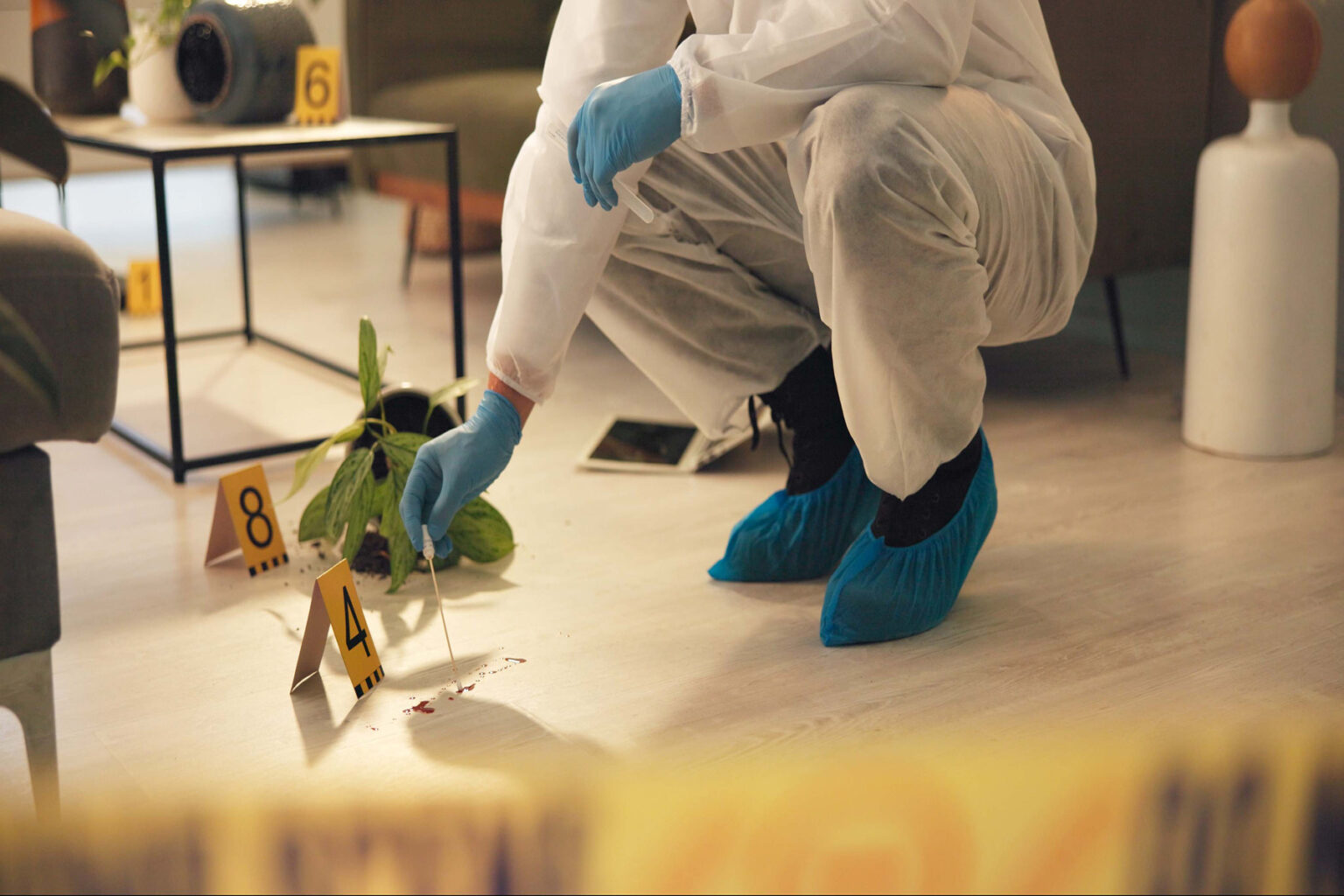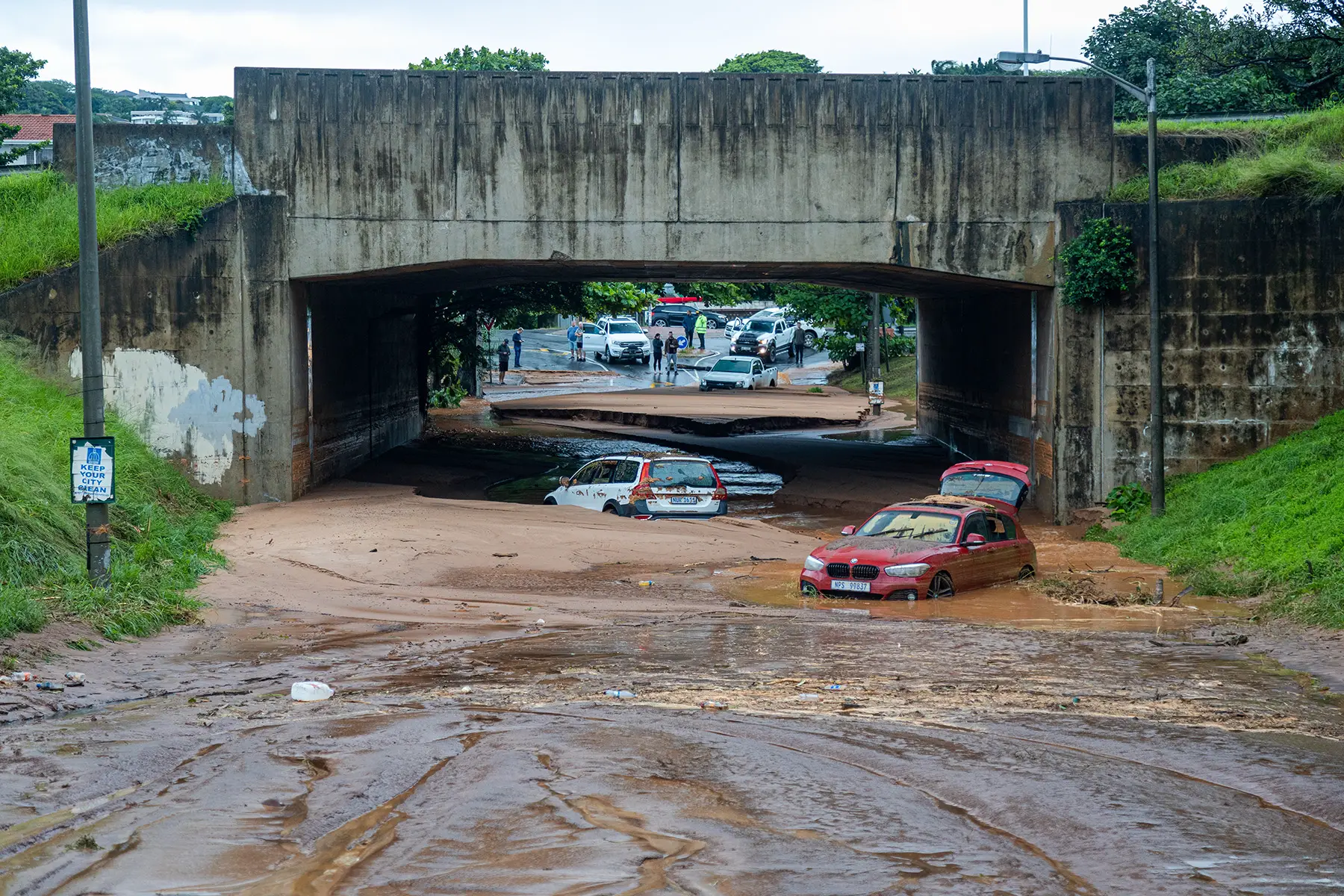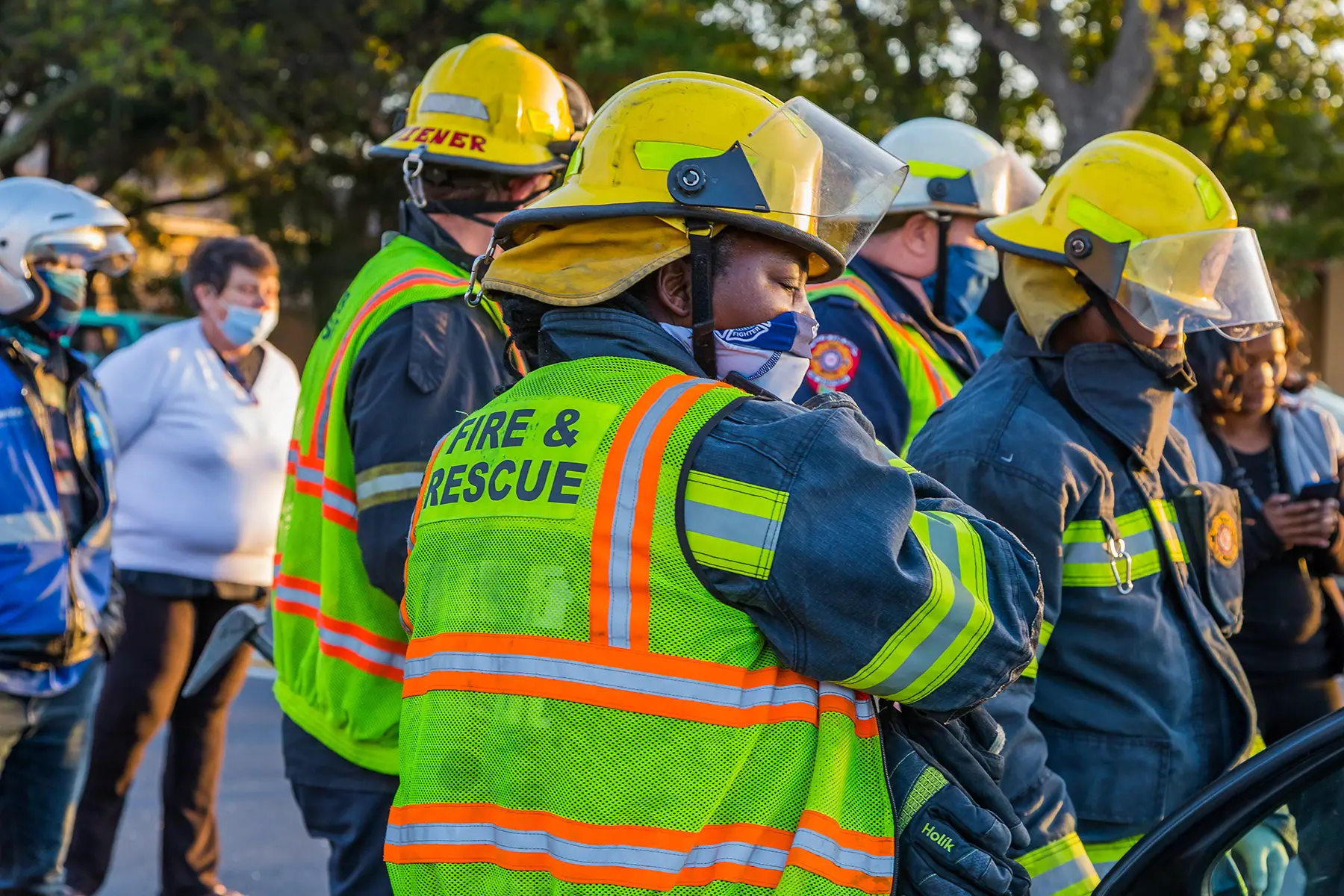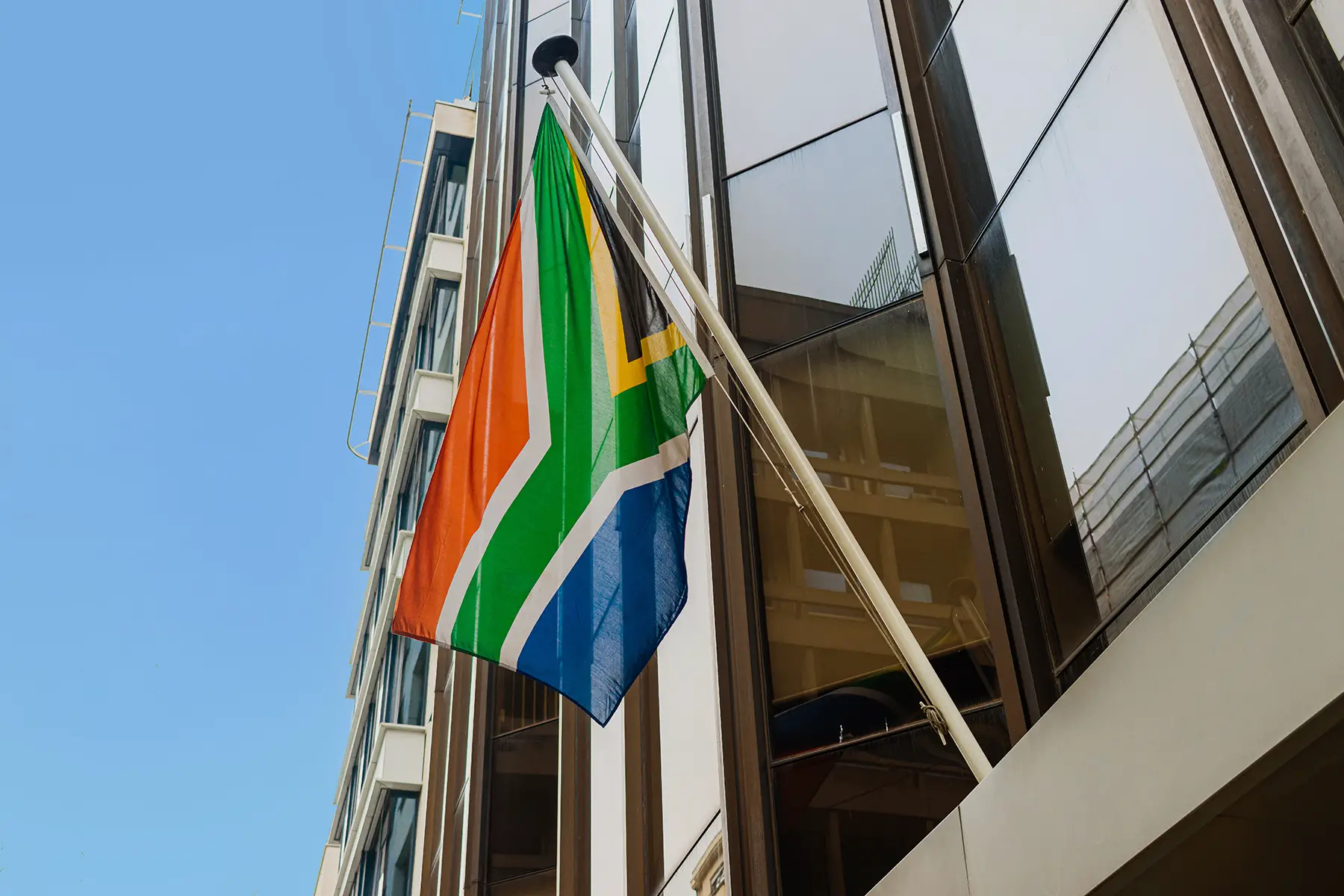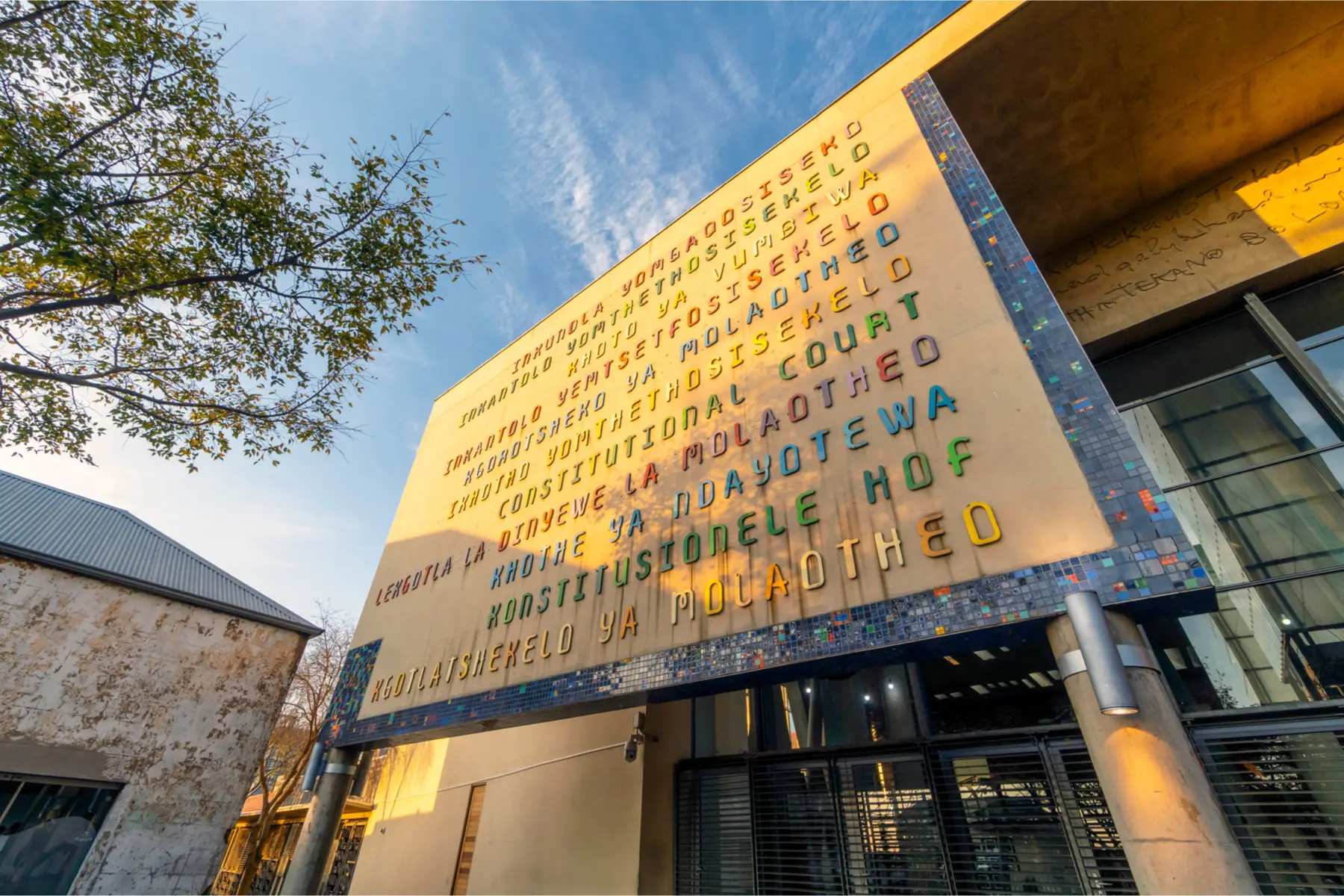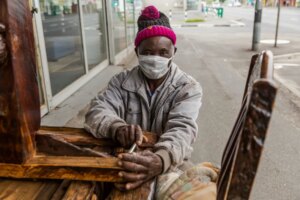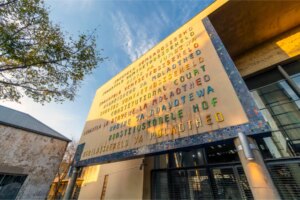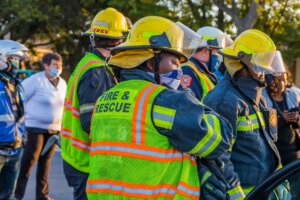South Africa is undeniably beautiful, with a vibrant culture and friendly locals. While it’s no secret that crime is a national issue, you don’t have to let fear rule your life. Many residents lead fulfilling lives by being street-smart, connecting with local law enforcement, joining community safety groups, and understanding their civic duties and rights.
Explore the following topics to gain a more nuanced understanding of crime and the legal system in South Africa:
- Introduction to the judicial system in South Africa
- An overview of crime in South Africa
- Crime prevention tips in South Africa
- Reporting a crime in South Africa
- The South African Police Service (SAPS)
- The criminal justice system in South Africa
- The trial process in South Africa
- Punishments and sentences in South Africa
- The prison system in South Africa
- Your rights if you are arrested in South Africa
- Legal rights for foreigners
- Useful resources
Ground News
Get every side of the story with Ground News, the biggest source for breaking news around the world. This news aggregator lets you compare reporting on the same stories. Use data-driven media bias ratings to uncover political leanings and get the full picture. Stay informed on stories that matter with Ground News.
Introduction to the judicial system in South Africa
The Republic of South Africa operates as a constitutional state, and its Bill of Rights forms a crucial part of its legal system. The Constitution holds supreme power, provides the framework for governance, and safeguards civil rights and responsibilities. It stipulates, particularly under the Bill of Rights, that everyone is equal before the law, providing the same civil protection and benefits.
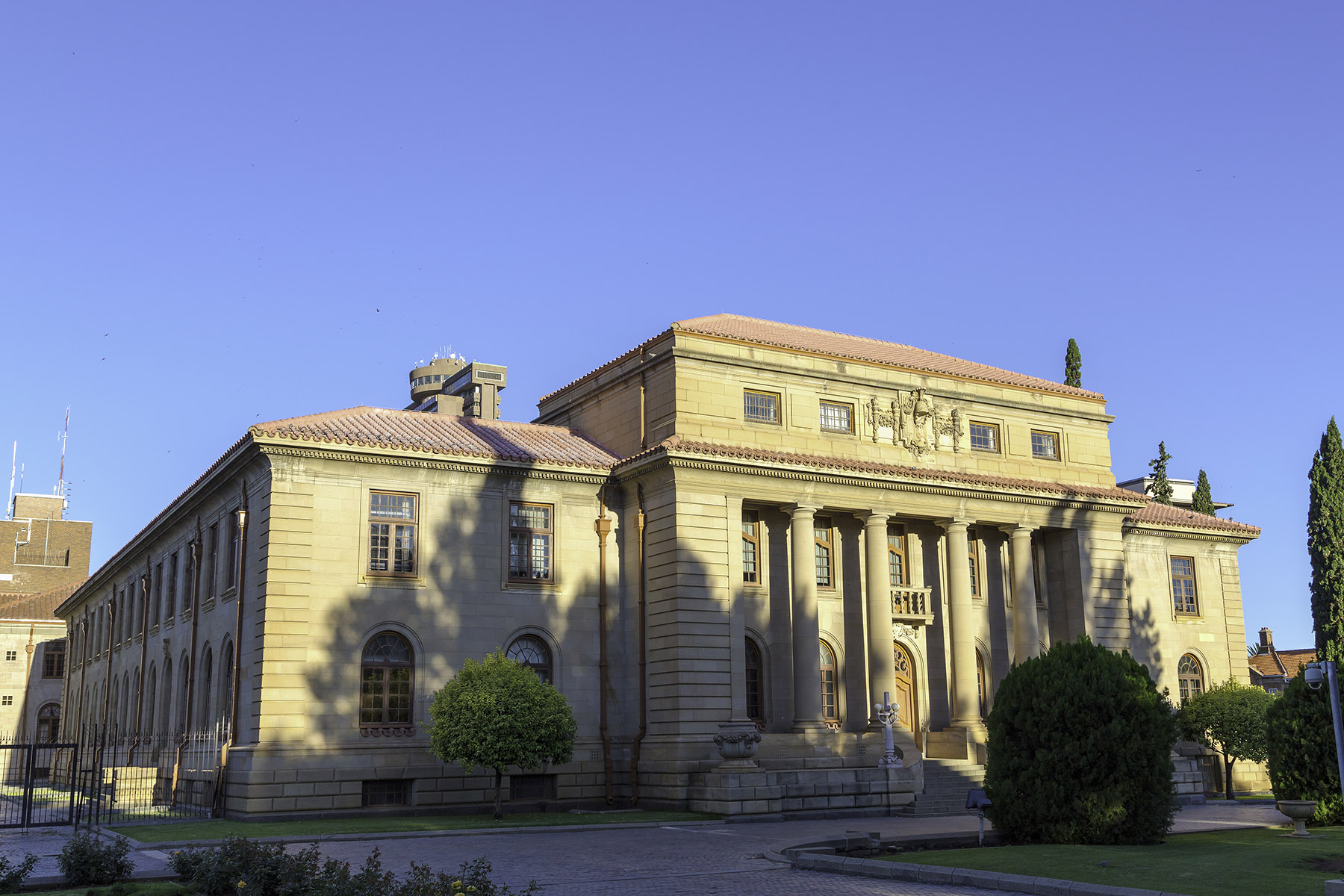
The legal system of South Africa is divided into three branches: legislative, executive, and judicial.
- Legislative: The parliament is responsible for making laws
- Executive: State departments and agencies enforce and implement laws
- Judicial: Courts interpret laws and decide legal disputes
The legal system combines Roman-Dutch and British common law with indigenous traditions’ customary ordinances and follows the principle of stare decisis; courts follow previous decisions when deciding similar cases. Therefore, unlike some legal systems, it is uncoded. In other words, it does not rely on a single, formal written document.
While South Africa operates as a unitary state, the Constitution grants the nine provinces restricted legislative autonomy in areas such as education, healthcare, and housing. Nonetheless, the national government maintains supreme judicial authority to supersede provincial regulations.
Issues and developments
Despite underfunding, backlogs causing delays, and incidences of corruption, the South African legal system remains resilient. It continues to deliver justice and endeavors to rebuild public trust in legal institutions. Additionally, the National Anti-Corruption Strategy for 2020–2030 aims to strengthen institutions’ capacity to combat corruption and promote transparency and accountability.
Authorities also consider technological advancements like online legal services and digital courtrooms to streamline processes and expand access. However, these innovations raise concerns about data security and the potential to exclude those who lack internet access or digital literacy.
Brief summary of South African laws
Primarily, the South African judiciary covers the following areas:
- Constitutional Law
- Criminal Law
- Civil Law
- Family Law
- Labor and Employment Law
- Administrative Law
- Commercial Law
- Environmental Law
- Tax Law
- Intellectual Property Law
- Property Law
- Human Rights Law
- Insurance Law
- Banking and Finance Law
- Health Law
- Telecommunications and Information Technology Law
- International Law
- Admiralty and Maritime Law
How fair is the South African legal system?
The Rule of Law Index (2023), compiled by the World Justice Project (WJP), ranks South Africa 56th out of 142 countries globally. Its overall score of 0.57 surpasses both the regional average of 0.47 and the worldwide mean of 0.55. These rankings have remained relatively steady since 2015.
A country’s proximity to a score of 1.00 indicates a closer adherence to the rule of law. On average, South Africa outperforms its regional counterparts. It also scores above the global average for most metrics – notably criminal and civil justice – except for the absence of corruption, order and security, and regulatory enforcement.
These rankings and scores are based on the following factors:
| Factor | South African global ranking | South African regional ranking | South Africa score | Global average | Regional average |
| Constraints on government powers | 40/142 | 3/34 | 0.62 | 0.54 | 0.46 |
| Absence of corruption | 69/142 | 7/34 | 0.47 | 0.51 | 0.38 |
| Open government | 34/142 | 1/34 | 0.62 | 0.52 | 0.41 |
| Fundamental rights | 48/142 | 3/34 | 0.63 | 0.56 | 0.47 |
| Order and security | 119/142 | 22/34 | 0.60 | 0.72 | 0.62 |
| Regulatory enforcement | 60/142 | 7/34 | 0.52 | 0.54 | 0.45 |
| Civil justice | 49/142 | 5/34 | 0.59 | 0.54 | 0.47 |
| Criminal justice | 55/142 | 5/34 | 0.50 | 0.47 | 0.38 |
Public trust in law enforcement and the legal system
Unfortunately, public trust in South Africa’s police and legal system has significantly declined over the past decade. For instance, surveys by the Human Sciences Research Council (HSRC) indicate that only 27% of South Africans have substantial trust in the South African Police Service (SAPS), a stark drop from nearly half the population in 2011.
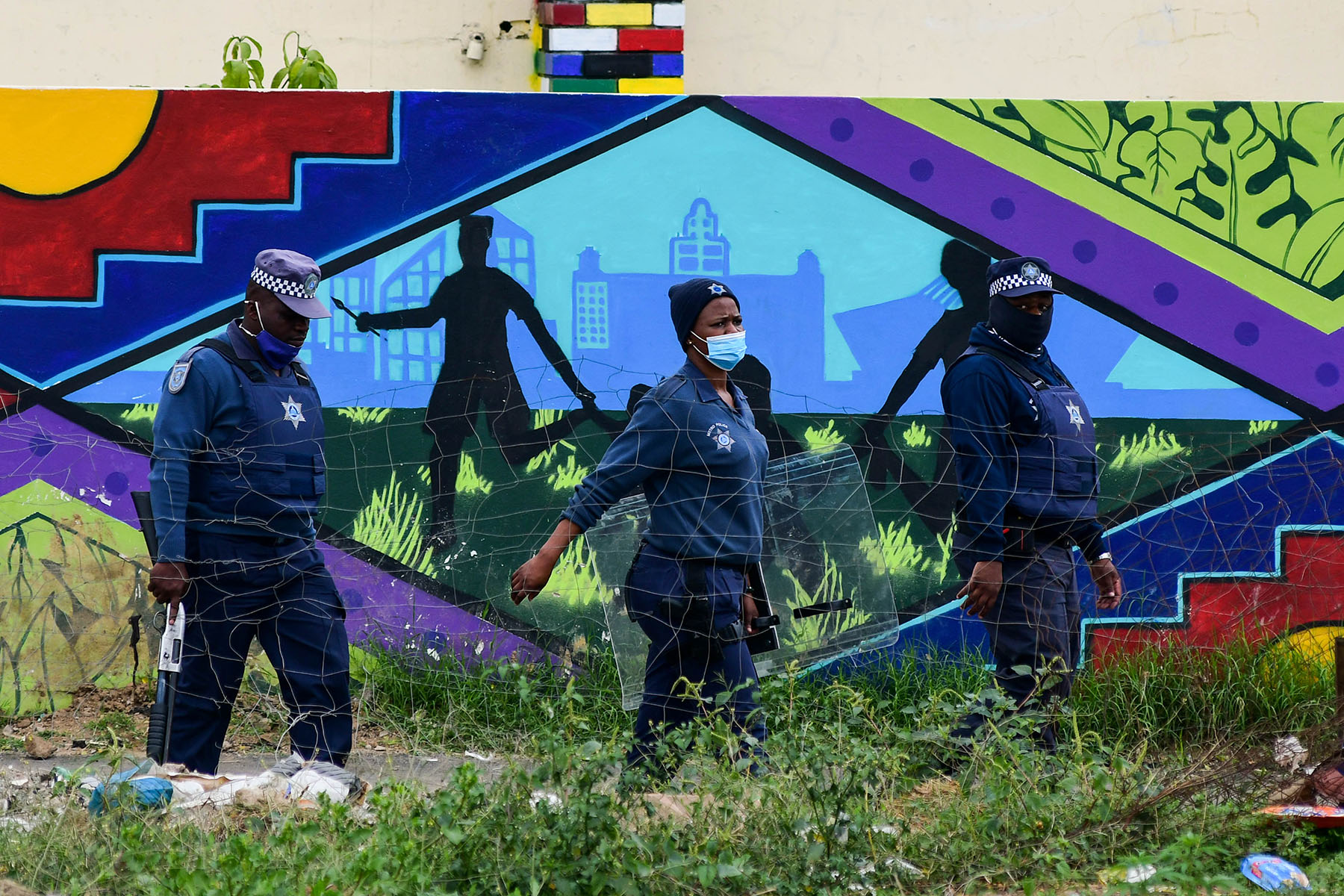
Furthermore, a small percentage of residents indicated that they were asked for bribes (2022/23) from traffic officials (2%), police officers (1.1%), and traffic center staff (1%).
This decline in public trust is attributed to perceptions of widespread corruption within the police force and poor performance during incidents like the July 2021 social unrest, which highlighted ineffectiveness and unfair conduct. Instability in leadership, frequent changes in the national commissioner position, and criticism of transparency and fairness in promotions and appointments further undermine public confidence.
Public trust in some other government institutions – especially local state departments – also declined between 2019/20 and 2022/23. Yet, it is still higher than 50%, particularly in the public school system.
Regarding local government trust levels, Limpopo leads with 69.1% of its residents expressing strong or general trust, followed closely by the Western Cape at 65.9%, and the Eastern Cape at 65.4%. These provinces show the highest public confidence levels in local government compared to other regions.
Efforts to address these issues include promoting procedural justice to enhance police legitimacy and community relations, but overall, public perception remains negative, posing a significant challenge to South Africa’s efforts to improve public safety and trust in its police and legal systems.
An overview of crime in South Africa
Although South Africa isn’t ranked as the most dangerous country worldwide, it grapples with notable crime issues that travelers and new immigrants should heed. Serious crimes such as murder, sexual assault and rape, gender-based violence (GBV), gang violence, cash-in-transit heists, burglaries, and carjackings are prevalent.
As is the case around the world, major cities such as Johannesburg, Pretoria, Durban, Cape Town, and Pietermaritzburg often have higher incidences of crime.
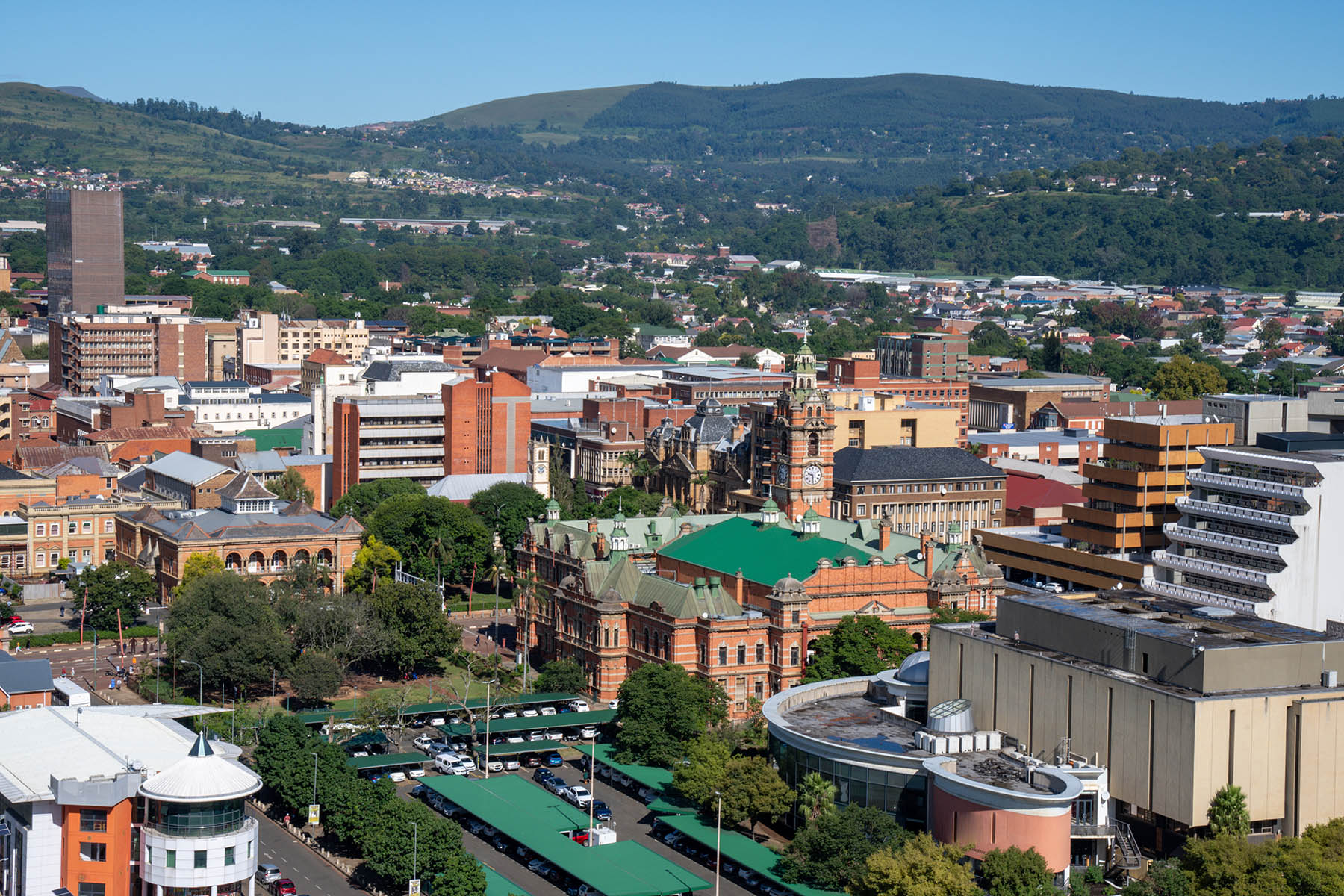
Still, crime rates vary across provinces and cities, but the most prevalent hotspots for violent offenses seem to be KwaZulu Natal, Gauteng, Western Cape, and Eastern Cape, in particular the areas of:
- Umlazi (KZN)
- Inanda (KZN)
- Delft (Western Cape)
- Plessislaer/Pietermaritzburg (KZN)
- Orange Farms (Gauteng)
- New Brighten (Eastern Cape)
- Mfuleni (Western Cape)
- Jeppe (Gauteng)
- Mariannhill (KZN)
- Roodepoort (Gauteng)
- Harare (Western Cape)
- Bethelsdorp (Eastern Cape)
- Kraaifontein (Western Cape)
- Kwamashu E (KZN)
- Empangeni (KZN)
Nevertheless, targeted police initiatives in these areas have occasionally lowered crime rates.
Global Peace Index
In 2023, South Africa scored 2.40 out of 5 on the Global Peace Index, which measures the peacefulness of countries. The lower the score, the more peaceful the country. These most concerning metrics include:
| Metric | Score |
| Homicides | 5/5 |
| Perceived criminality in society | 4/5 |
| Violet crime | 4.5/5 |
| Violent demonstrations | 4/5 |
| External conflicts fought | 3.7/5 |
| Safety & Security | 3.11/5 |
| Jailed population | 2.97/5 |
Notable crime rates in South Africa
Comparing official crime statistics (South African Police Service) from 2020 to 2023, overall contact crime (e.g., murder, assault, robbery) has increased by 3.8%, except sexual offenses showed a decline of 1.7%. For example, between October and December 2023, the police investigated:
- 7,710 homicides
- 52,965 assaults
- 13,243 robberies
Even though records showed a decrease in the percentage of sexual assaults, the same three-month period recorded still:
- 12,211 rapes
- 2,114 sexual assaults
- 773 attempted assaults
- 186 contact sexual offenses
The Department of Justice and Constitutional Development (DoJCD) estimates that there are more than 50,000 cases of gender-based violence (including femicide) each year, with around 21% (one in five) of women in relationships experiencing abuse by their partners.
Most gender-based assaults on women and girls are committed by someone close to them:
- Spouse/intimate partner: 15%
- Relative/household member: 12.6%
- Friend/acquaintance: 22%
- Unknown person: 28.8%
- A mob: 9.4%
- Other: 10.6%
Other notable crime statistics for this time frame include:
- Carjackings: 5,937 (increased by 6.5%)
- Residential robbery, residents present: 6,360 (increased by 1.7%)
- Burglary at residences: 40,751 (decreased by 4.4%)
- Cash-in-transit heists: 46 (decreased by 11 counts)
- Stock-theft: 7,290 (decreased by 2.1%)
Official SAPS statistics on rural crime, colloquially called farm attacks, are limited. They often record these incidents under broader crime categories, such as murder and robbery. Crimes like stock theft have significant economic impacts on farmers and the agricultural sector. They affect commercial and emerging farmers and significantly undermine their livelihood and financial stability.
Farming communities continuously criticize rural policing, accusing it of inefficiency and resulting in low conviction rates. The issue of farm attacks is indeed sensitive, complex, and often politicized, involving various socioeconomic elements, including racial tensions and land ownership disputes.
Crime prevention tips in South Africa
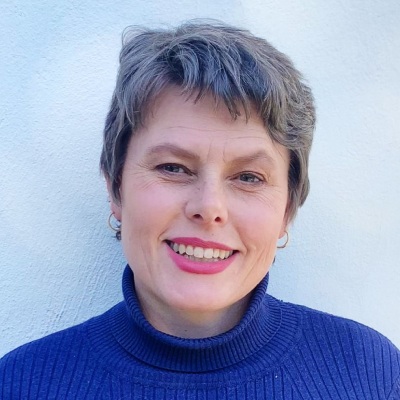
Local expert
Christelle Myburgh
Insider tip
Just as in many other countries, exercising common sense is advisable to steer clear of potentially risky situations while living in South Africa. Given the reality of crime in the country, it’s prudent to consider insuring your vehicles and valuables for added security.
For more local crime prevention tips, read on:
Be street savvy
You do not have to live in fear, but you need to be vigilant, for example:
- Never leave your belongings unattended
- Keep your cell phone and purse hidden when you are not using it
- Do not carry large amounts of cash or wear overly expensive jewelry
- Be aware of people around you and their actions
- Never accept an offer for assistance at an ATM or when you are making a purchase (as pickpockets use this as a distraction)
- Do not walk around major city centers (e.g., Johannesburg, Durban, Cape Town, Pietermaritzburg, or Pretoria) alone after dark
Stay safe while driving and using public transport
When you drive, it is best to lock your car doors and windows and put your valuables (e.g., purse or cell phone) out of sight to avoid smash and grabs.
If you do a road trip or drive at night, it is always a good idea to let someone know when you expect to be at your destination.
Public transport is not as regulated as in the United Kingdom (UK) or Europe, so only use the trains and minibus taxis if you are accompanied by a trusted, savvy local who knows the system.
Neighborhood watch and private security companies
Indeed, you can be a victim of crime regardless of where you live, be it an informal settlement, lower-income, or wealthier community. However, residents of informal settlements are often more vulnerable as higher-income areas have access to gated housing developments or securely fenced homes with alarms, guard dogs, and armed response by private security companies.
Many areas may also have a neighborhood watch to alert others of any suspicious behavior in their street or suburb.
Cybercrime
The Cybercrimes Act in South Africa aims to prevent and reduce online crimes in the country.
Some tips to stay safe online include:
- Personal data: Keep secure and do not give it to anyone you do not know or trust, including subscriptions, emails, mobile chats, or texts
- Emails, links, and attachments: Do not open any attachments or click on links from unfamiliar email addresses or unsecured websites
- Passwords: Change frequently or use a secure, online password manager/vault or an authenticator app to generate unique passwords or time-limited codes
- VPN: Always use when browsing the internet, like NordVPN or SurfShark
- Automatic software updates: Set these up on all your devices
- Antivirus software: Install on all your devices
Reporting a crime in South Africa
If you are a victim of a crime
If you are a victim of a crime, you must report it at the nearest police station or call 10111 for police in an emergency (24/7). You can also call 112 from your mobile to be connected to the police, ambulance, or fire service.
Of course, if you or someone else needs critical medical attention, it is best to first call an ambulance at 10177 or the private medical response service Netcare at 082 112 from your mobile. You need to pay for Netcare out of pocket or claim it back from your health insurance (i.e., medical aid).
Once reported, the police will open a case docket. Officers will take a formal statement from the victim and any witnesses (if possible) at the scene or station and register the case in the SAPS Crime Administration System (CAS).
The completed case docket will be allocated to a police detective – your primary point of contact – to investigate the crime. Once they finish the inquiry, they present the docket to the relevant court for prosecution. The detective should inform you of the case’s progress, including when to attend the court hearings to testify if needed. However, you can contact the investigator with any questions or queries.

Local expert
Christelle Myburgh
Insider tip
You should receive a CAS number via SMS or phone; keep it as a reference for future inquiries regarding the criminal case.
If you want to report a crime anonymously and are not in immediate danger, call 08600 10111.
Reporting gender-based violence (GBV) and LGBTQIA+ hate crimes
If you are a survivor of domestic abuse – but do not require urgent medical attention – and do not feel ready to call the police directly, you can contact the following helplines and organizations:
| Organization | Service | Numbers |
| Gender-Based Violence (GBV) Command Centre | 24/7 helpline Text from mobile for a call back | 0800 428 428 *120*7867# |
| Gender Violence Helpline | 24/7 helpline WhatsApp counseling | 0800 150 150 |
| Lifeline South Africa | 24/7 counseling line | 0861 322 322 |
| Saartjie Baartman Centre for Women and Children | Specialized programs and support for survivors/emergency shelters (Western Cape) | 021 633 5287 |
| Childline | 24/7 helpline (GBV, sexual violence, other) | 116 |
| Triangle Project | LGBTQIA+ helpline (Western Cape, 13:00–21:00) | 021 712 6699 |
You can also find detailed information on the SAPS website on how to apply for a protection order.
If you experience any form of violence or hate crime as a member of the LGBTQIA+ community, you can also lodge it via the Love Not Hate initiative, in addition to reporting it to the police.
Reporting a missing person
You do not need to wait a prescribed time before reporting a missing person; instead, report it immediately at your nearest police station. The police will require the following information:
- A recent photo of the person
- A detailed description of their clothing, whereabouts, and activities the last time you saw them
- Complete and sign a SAPS 55(A) form, which safeguards the police from hoax reports and indemnifies them for distributing the photograph and information of the missing person
Remember to take the investigating officer’s contact details to provide additional information or let them know if the person is found or returns home voluntarily. In this case, you need to complete a SAPS 92 form to notify the Bureau of Missing Persons that the report can be removed from circulation.
Reporting a sexual offense
When you report a sexual offense to the police, you can expect the following:
- As a survivor, you can have a support person present
- You can request the location where you feel safe for the interview
The officer should first ensure that you receive medical treatment if needed and help to access available counseling services, for example:
| Organization | Service | Numbers |
| Rape Crisis Cape Town Trust | Counseling and resources (Western Cape) | 021 447 9762 (24-hours) 021 361 9085 (isiXhosa) 021 633 9229 (Afrikaans) 083 222 5164 (WhatsApp) |
| Lifeline South Africa | 24-hour phone counseling | 0861 322 322 |
| Thututzela Care Centres (TTC) | One-stop facilities, often at hospitals, to assist survivors of sexual assault and rape; provide medical care, counseling, and legal assistance | List of centers |
| Tears Foundation | 24/7 helpline; access to medical care, counseling, and legal assistance | *134*7355# (toll-free, mobile phone) 010 590 5920 (standard rates) |
If the victim is a minor or vulnerable, the police also must take steps to safeguard them.
Once the police officer has opened a case docket and registered the investigation on CAS, they will ask you to sign an affidavit declaring:
- The time, date, and place of the offense
- The nature of the offense and how it was committed
- The contact details of the first person whom you told
- Any details regarding the alleged offender(s) that may assist in identifying and finding them
- Any details regarding possible witnesses
If possible, it would help the investigation if you could keep your clothing in a paper bag to give to the police for evidence and not shower or bath before the medical examination. However, experiencing sexual violence is deeply traumatic, impacting you emotionally and physically. Therefore, your well-being comes first, which can start by reaching out for support from trusted sources.
If you witness a crime
Again, you can report a crime anonymously via the Crime Stop number at 08600 10111 or the nearest police station.
However, in South Africa, individuals are not legally obligated to report a crime unless it falls within their professional duties (e.g., a social worker, a teacher, or a doctor) or if a sexual offense was committed against a child or a person with learning difficulties (if they are considered vulnerable).
If you have captured any footage related to the incident, individuals, or vehicles involved, it is advisable to share it with law enforcement; it can be crucial evidence in the investigation.
The reporting and investigation process for witnesses is akin to that of reporting a crime as a victim.

Local expert
Christelle Myburgh
Insider tip
If you have to appear in court as a witness, it might be possible to arrange a specific time with the prosecutor, sparing you from lengthy waits at the courthouse.
The South African Police Service (SAPS)
For immediate police assistance, dial the national emergency number at 10111. This is the fastest way to get help. Alternatively, you can also visit the nearest police station; there are more than 1,100 across all nine provinces.
The South African Police Service (SAPS) is governed by the Ministry of Police, which not only sets the national law enforcement policies but also oversees the strategic direction and operations of the SAPS.
The SAPS is the country’s primary law enforcement agency, responsible for preventing and investigating crime, enforcing laws, maintaining public order, and protecting individuals and their property. Regional metropolitan police departments handle local law enforcement in major cities such as Johannesburg, Cape Town, and Durban.
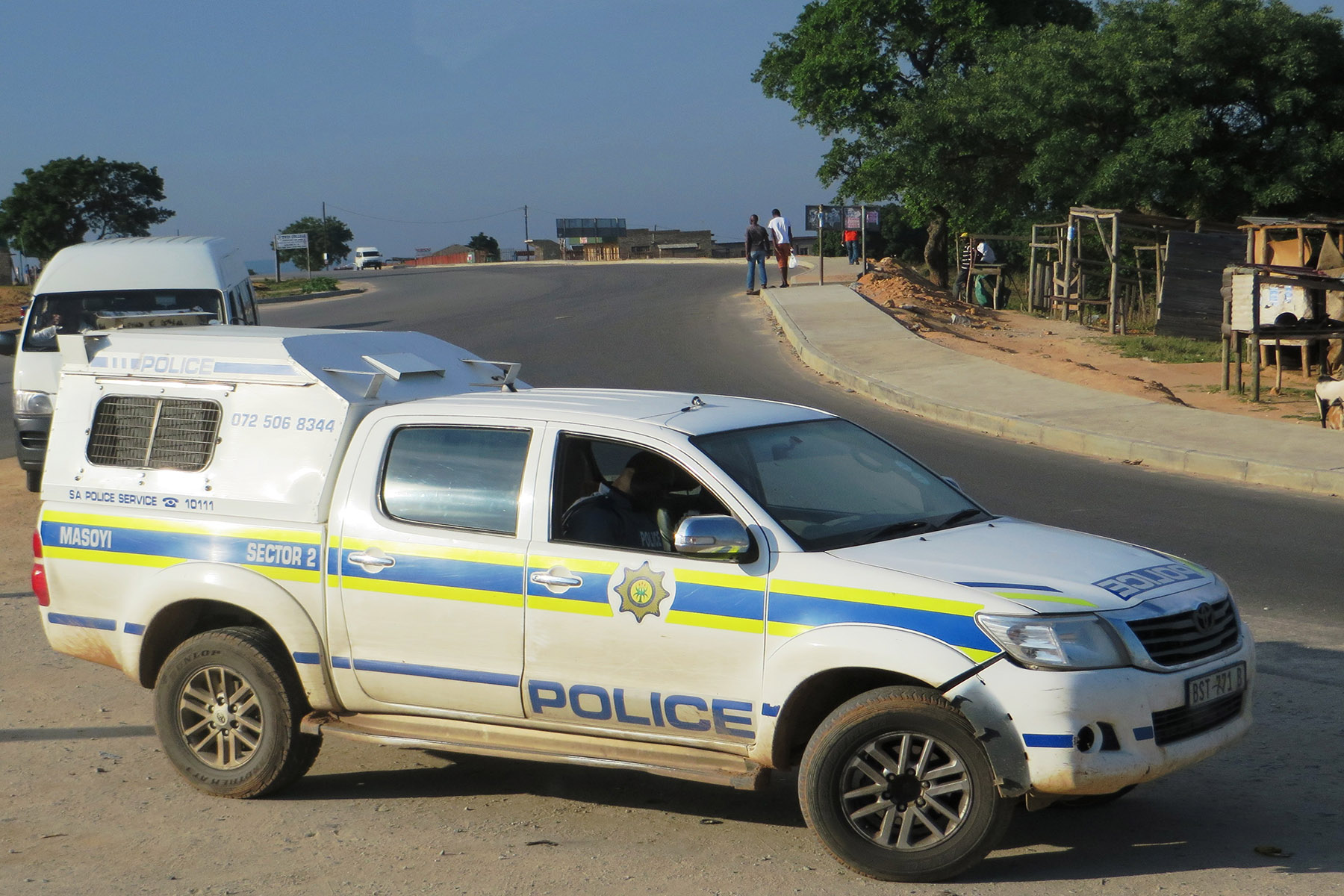
Police officers wear blue uniforms with the word ‘POLICE’ embroidered in gold lettering on the front shirt pocket. A police insignia with the officer’s rank is attached to the shoulder lapel. They may often wear dark blue Kevlar vests with the word ‘POLICE’ written in white on the front and back. Indeed, SAPS officers are armed with 9mm pistols but may also carry other firearms, such as rifles and shotguns. Each officer would also be equipped with a radio, handcuffs, and possibly pepper spray, and a taser.
They will don special riot gear and may use tear gas and rubber bullets to disperse a crowd when they perceive the situation to turn violent.
SAPS vehicles are highly visible. They are usually white with blue accents, displaying the SAPS logo and often the word ‘POLICE’ in large letters. They also have distinctive blue and red lights on top, accompanied by sirens, ensuring clear identification. These lights and sirens are used during emergencies to alert other road users to clear the way for the police vehicle.
Specialized units
Specialized or elite units also form part of the SAPS, including:
- The Hawks (Directorate for Priority Crime Investigation): Focuses on organized crime, economic crime, corruption, and other serious crimes
- Public Order Police (POP): Handles crowd management and riot control
- Tactical Response Team (TRT): Deals with high-risk operations, terrorist attacks, and violent criminals
- Family Violence, Child Protection, and Sexual Offences (FCS): Specializes in crimes against women and children
- K9 Unit: Utilizes trained dogs for various tasks, especially drug detection and tracking
- Bomb Squad: Expertise in handling explosives and hazardous devices
Besides SAPS, private security companies (e.g., ADT, Fidelity, or G4S) play a significant role in community safety, particularly in urban areas where they patrol neighborhoods and respond to security alarms. However, this is a paid service, and many people in South Africa cannot afford their services. These companies often collaborate with public law enforcement to enhance safety.
Community policing sectors and forums also exist where police and community members collaborate to improve local security.
Traffic police
South Africa has a separate entity known as the Road Traffic Management Corporation (RTMC), which the Department of Transport regulates. The RTMC has provincial and local traffic officers to enforce driving laws (e.g., monitoring speed and checking vehicle roadworthiness).
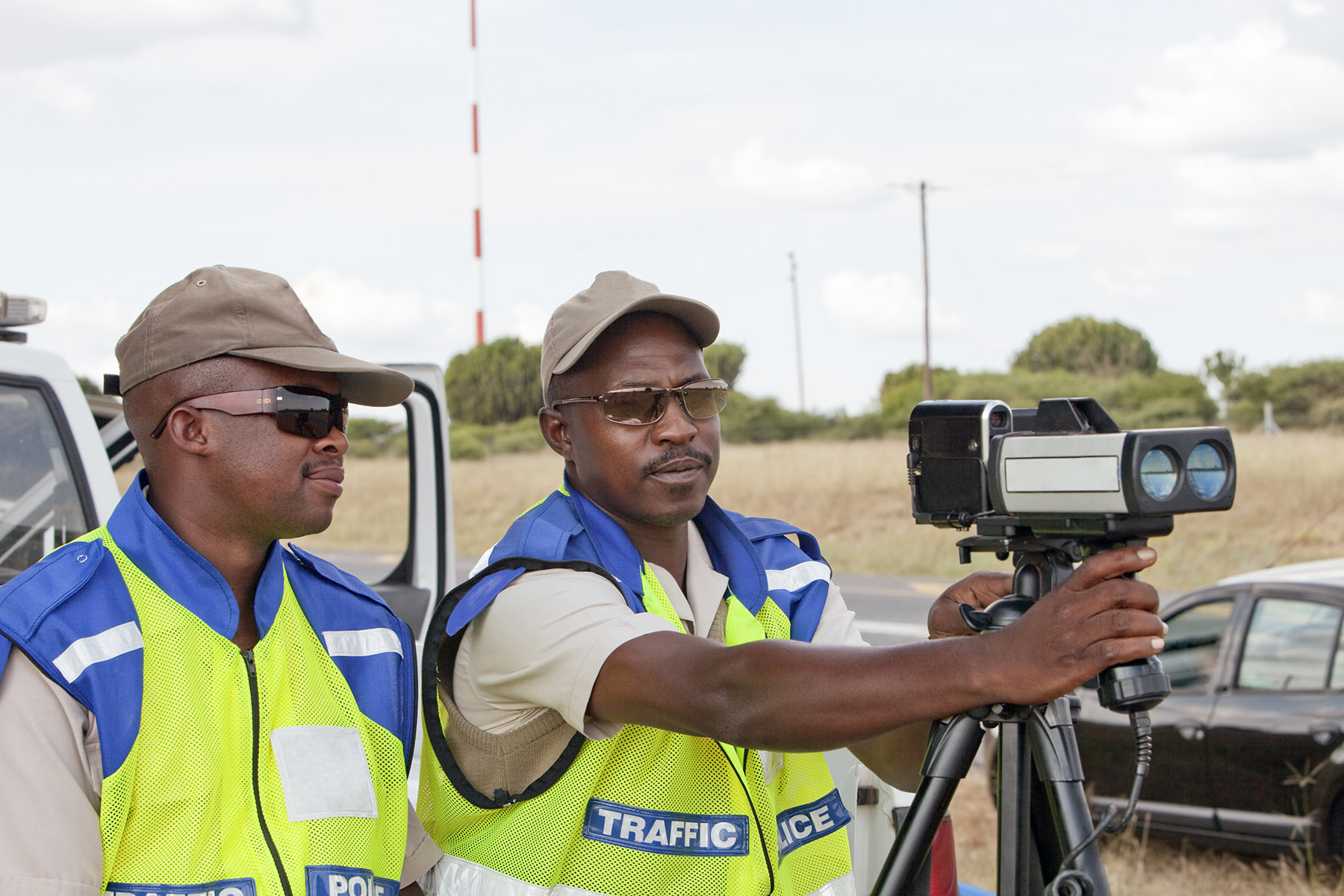
During their patrols, the traffic officers wear khaki uniforms with high-visibility reflective vests . The word ‘TRAFFIC’ is prominently displayed on both the vests and the badges pinned to their shoulder lapels. Traffic police vehicles are white with prominent blue and yellow reflective stripes marked with the word ‘TRAFFIC’ to distinguish them from other police vehicles.
The criminal justice system in South Africa
The Department of Justice (DOJ) in South Africa oversees the criminal justice system to ensure accessible and equitable legal processes for all residents. The following departments are involved – in this sequence – when a crime occurs:
- South African Police Service (SAPS): Enforces laws, investigates crimes, and makes arrests
- National Prosecution Authority (NPA): Decides whether to prosecute an accused based on the case evidence presented by the police
- Judiciary/courts: The presiding officer (magistrate/judge) hears the case, rules on the guilt or innocence of the alleged offender based on the evidence presented in court, and passes down a sentence; if guilty
- Prisons: Regulated by the Department of Correctional Services (DCS) enforces the sentence if it includes incarceration and may enroll a convicted prisoner into rehabilitation programs
- Probation: Officers appointed by the Minister of Social Development (DSD) work with released offenders who have served their sentence to help them reintegrate into society and prevent recidivism
- Social workers: Works with survivors of crime and families in the community
Like many African nations, South Africa is a member of Interpol, which focuses on combating organized crime related to wildlife, stock theft (including forestry trees), human trafficking, smuggling of illegal substances, firearms, counterfeit goods, and cybercrime.
The court system
The South African judiciary is hierarchical (i.e., higher and lower courts) and hears cases depending on the nature of the offenses.
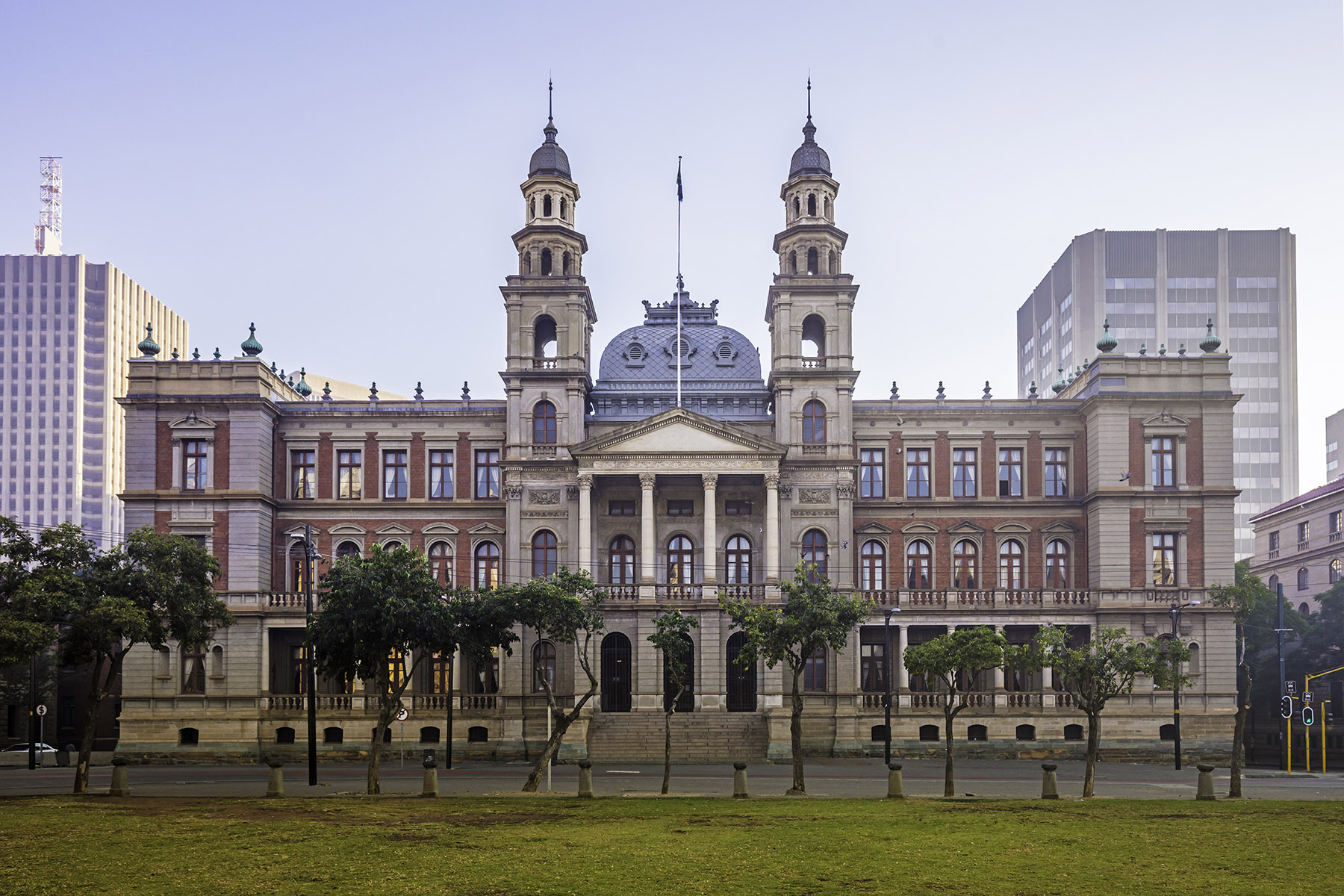
Higher courts include:
- The Constitutional Court
- Supreme Court of Appeal
- High Court (including the following divisions)
- Tax Courts
- Labour Courts and Labour Appeals Courts
- Land Claims Court and Land Court
The Constitutional Court
The Constitutional Court has supreme judicial power, and no other court can overturn its rulings. It consists of 11 judges, led by the Chief Justice, assisted by the Deputy.
It adjudicates:
- Constitutional matters: The interpretation, protection, or enforcement of the Constitution
- General issues: Concerning general and public significance if granted leave to appeal
Supreme Court of Appeal
Next is the Supreme Court of Appeal (SCA), which consists of a president, a deputy president, and several judges. The SCA handles appeals except in labor and competition cases originating from the High Court or a court of similar status.
Only the Constitutional Court can overturn its decisions; however, the SCA can revise its own rulings. The SCA’s final decision aligns with most judges on the panel. The case restarts before a new court if the panel cannot reach a majority agreement.
High Court
The High Court – one in each province – has jurisdiction over criminal and civil cases not allocated to other courts and hears appeals from the magistrates’ courts. This tier of the judiciary also includes circuit courts in remote, rural areas.
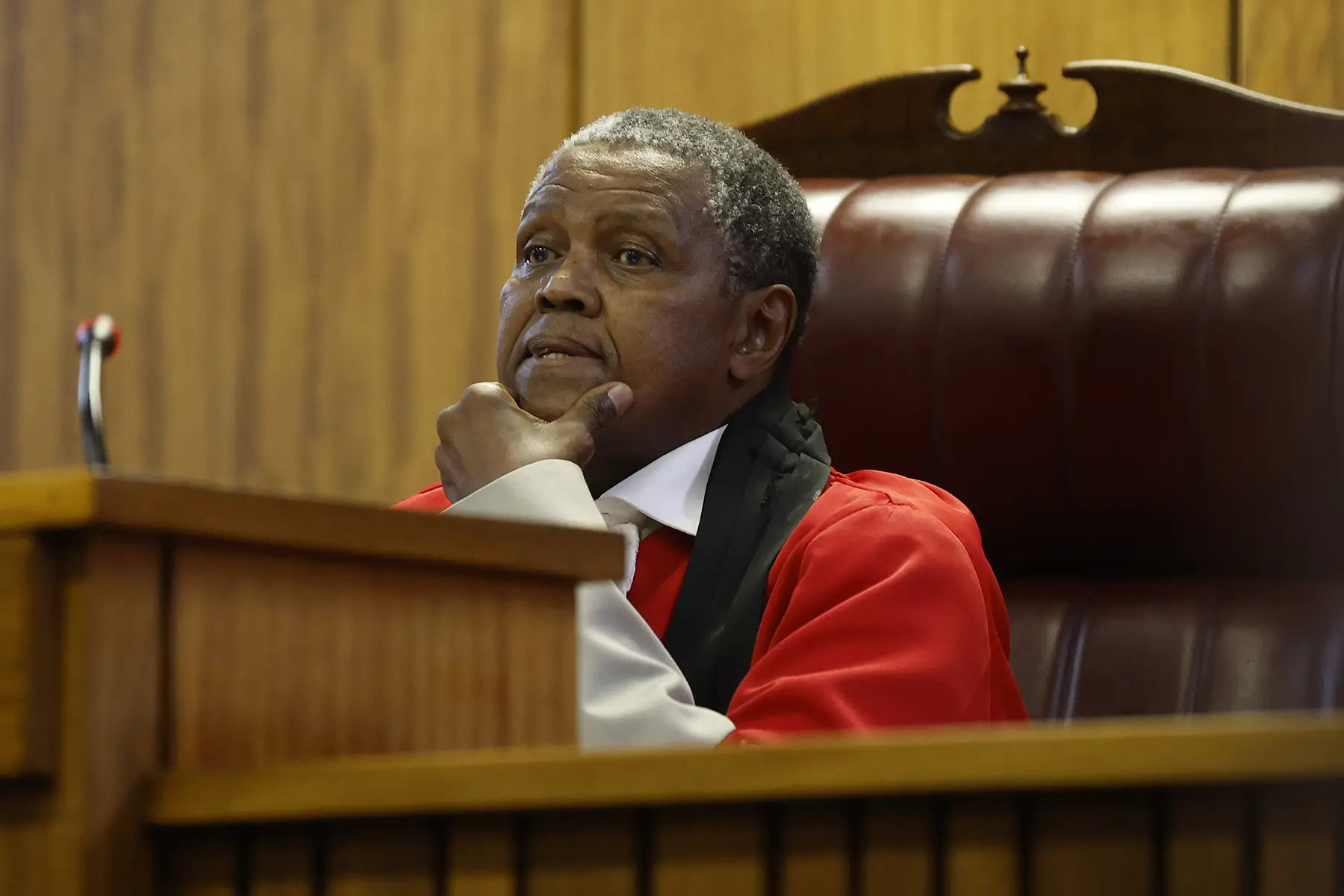
The most important officers in a High Court include:
- Registrar: Primarily administrative but includes semi-judicial tasks such as issuing civil process. They also serve as taxing masters, compile case lists, assist judges, and maintain records.
- Family Advocate: Helps parties resolve disputes over child custody, access, and guardianship. If no agreement is reached, they assess the situation based on the children’s best interests and recommend a decision to the court.
- Master of High Court: Assists the public with deceased estates, liquidations, registration of trusts, tutors and curators, and administration of the Guardian’s Fund ( on behalf of minors and vulnerable people with learning difficulties)
- Sheriff: Impartial and independent official appointed by the Minister of Justice and Constitutional Development to serve court documents such as summonses, warrants, and court orders
- Directors of Public Prosecutions: Determines if there are grounds for trial and sufficient evidence for a conviction based on the police investigation, oversees a team of prosecutors
- State Attorney: Lawyers that represent the State and its departments in civil cases, as well as officials sued in their work capacity
Lower courts
Magistrates’ courts are lower courts categorized into districts and regional courts. They hear civil, criminal, and divorce cases. To clarify, see the table below.
| Court | Jurisdiction over matters |
| Regional courts | Divorces and related matters |
| Criminal courts | Regional: serious crimes (e.g., murder, rape, armed robbery) District: less serious cases |
| Children’s courts | Regional jurisdiction, based on the Child Justice Act |
| Sexual offenses courts | Regional jurisdiction |
| Specialised Commercial Crime Courts (SCCCs) | Regional jurisdiction |
| Maintenance courts | Located at each Magistrates’ Court |
The Equality Courts, an extension of the magistrates’ courts, provide marginalized citizens or residents who cannot afford legal expenses with access to justice for claims of unfair discrimination, hate speech, or harassment. Legal representation is not mandatory, and you can lodge a claim without any costs.
Each district has a Small Claims Court (SCC), where individuals can bring claims up to R20,000. You do not need legal representation, and the presiding officer is not a judge or a magistrate but a Commissioner (i.e., advocate or attorney).
Traditional Courts, also known as Makgotla or Inkundla, are dispute resolution systems based on customary law. They are utilized in rural areas to resolve conflicts according to the community’s cultural practices and customs. This approach aims to make justice more accessible to the local population.
The trial process in South Africa
The judiciary in South Africa aims to administer justice fairly, impartially, and timely, adhering to national laws and international human rights standards.
Investigative phase
To initiate a court case, an individual must first file a complaint, or the police must arrest a suspect following an investigation in which enough evidence is gathered about a criminal offense.
Once arrested, the accused must appear before a court within 48 hours, where they will hear the charges and be informed of their rights. Next, the arrested person can make a bail application. The judge will approve or reject the request and set an amount based on the severity of the charge, community safety, and the applicant’s flight risk.
The court will also set the date of the trial. During this period, both the defense and the prosecution prepare their cases by gathering evidence, interviewing witnesses, and formulating legal arguments. It may also include pre-trial conferences and motions to set procedural matters.
Trial phase
South African courts do not have a jury system. Instead, a judge or a magistrate decides a ruling and delivers a sentence based on all the evidence presented in court and the country’s laws. In higher courts, there may be a panel of judges. Typically, the trial process includes:
- Opening statements
- Presentation of evidence
- Witnesses called and cross-examined
- Closing arguments
- Judgment
If the accused is found guilty, a sentencing hearing will be scheduled. Both sides can present arguments regarding the appropriate penalty. The judge then determines the outcome based on legal guidelines and the specifics of the case.
The convicted party retains the right to appeal the verdict or the decision. Depending on the nature of the case, appeals are heard in higher courts, such as the High Court, Supreme Court of Appeal, or the Constitutional Court.
Once all avenues are exhausted or if none is filed, the penalty is enforced. This may involve imprisonment, fines, or community service.

Local Expert
Christelle Myburgh
Insider Tip
The duration of a trial in South Africa hinges on its complexity. However, due to the overloaded system, even relatively simple court cases can extend for months.
Punishments and sentences in South Africa
The sentencing in South Africa is guided by the “triad of Zinn“, which includes three main considerations:
- The seriousness of the offense
- The circumstances of the offender
- The public interest
This approach ensures a balanced consideration of all relevant factors to reach a fair and just sentence.
High Courts handle the most serious offenses, including murder, rape, and treason, and can impose life sentences if warranted by the severity of the case.
Regional courts in South Africa can try all crimes except treason and can impose a maximum sentence of 25 years imprisonment or a fine of up to R600,000. This covers more serious offenses but not the most severe crimes, which are reserved for the High Court.
District magistrates’ courts try less serious offenses and cannot adjudicate cases involving murder, treason, rape, terrorism, or sabotage. The maximum sentence they can impose is three years imprisonment or a fine of up to R120,000.
South Africa abolished capital punishment (i.e., death penalty) in 1997.
Statute of limitations
The Criminal Procedure Act 51 of 1977 (CPA) regulates processes and related matters in criminal cases. Section 18 of the CPA specifies that the right to prosecute for any offense expires after 20 years from when the crime was committed, except for murder, rape, or treason.
South Africa’s laws set minimum sentences for serious crimes like murder, rape, human trafficking, and weapon smuggling. Judges can only deviate from these minimums if they have “substantial and compelling reasons,” which they must defend in their rulings.
| Type of crime | Possible punishments |
| Violent crimes (murder, rape, assault) | Life imprisonment (25 years) |
| Property crimes (burglary, theft, and robbery) | Robbery – imprisonment, the length of which depends on the value of the property involved and whether any violence or threats were used Theft and burglary – varying sentences from fines and community service to several years in prison |
| Financial crimes (fraud, corruption, and other white-collar offenses) | Significant penalties, including fines and long-term imprisonment. For instance, fraud involving large sums of money or severe breaches of trust may lead to sentences of over 15 years in prison |
Prevalent crimes and their punishments
Most serious and violent crimes
Offenses such as murder, rape or sexual violence, assault, and armed robbery would be considered serious, especially as they may often be accompanied by violence or result in the death of a victim.
The sentence will depend on the severity of the crime, for example:
| Crime | Aggravating circumstances | Punishment |
| Aggravated murder | Premeditated The victim is a police officer/state witness As a result of rape/robbery Execution (e.g., organized crime) Killed for body parts (e.g., muti murders or ‘witchcraft’) | Life imprisonment, 25 years, eligible for parole after this period |
| Murder | None | First offense: 15 years Second offense: 20 years Third offense: 25 years |
| Aggravated rape | Breaking and entering a property with a firearm and the intention to use it | Life imprisonment, 25 years, eligible for parole after this period |
| Rape/sexual assault | None | First offense: 10 years Second offense: 15 years Third offense: 20 years |
| Human trafficking | Any circumstances | Life imprisonment, 25 years, eligible for parole after this period, depends on the offender’s previous convictions |
| Arms smuggling | Any circumstances | First offense: 15 years Second offense: 20 years Third offense: 25 years |
| Armed robbery | Depends on the circumstances (e.g., weapons used, if any person was harmed or killed, amount of money stolen, damage to property) | First offense: 5 years Second offense: 7 years Third offense: 10 years |
| Cash-in-transit heists | Depends on the circumstances (e.g., weapons used, if any person was harmed or killed, amount of money stolen, damage to property) | First offense: 15 years Second offense: 20 years Third offense: 25 years (life) |
| Carjacking | Use of a firearm Use of force or violence that resulted in inflicting grave bodily harm or death of the victim | First offense: 15 years Second offense: 20 years Third offense: 25 years |
Theft/burglary
The sentencing for theft or burglary without a weapon and no physical harm to the victim is considerably lighter than for armed robbery. However, punishments vary based on factors, such as the value of stolen goods, whether it’s the offender’s first offense, and the accused’s age.
Fraud
Offenses related to fraud, extortion, forgery, uttering, or theft carry similar penalties, depending on the value involved and whether it is a first offense.
| Crime | Aggravating circumstances | Punishment |
| Intentional fraudulent offense | Amounts exceeding R500,000 Amounts exceeding R100,000 by a syndicate (e.g., organized crime) Amounts exceeding R10,000 by a law enforcement officer | First offense: 15 years Second offense: 20 years Third offense: 25 years |
Immigration-related crimes
Foreign nationals who are found to be in South Africa illegally (e.g., overstayers or without valid immigration documents) can be arrested, detained, and deported.
Detention can last up to 120 days, but the accused have the right to appeal the lawfulness of their arrest within 48 hours. A deported person may also face a one- to five-year ban from re-entering South Africa. This ban applies to all transgressors, including minors and those whose visas expire while waiting for the outcome of an extension application.
Hiring or being employed without the appropriate work permit is also a punishable offense. Both the employer and the employee can face fines and legal actions.
Furthermore, assisting someone to enter, stay, or work in South Africa illegally is considered a crime, and the penalties can include hefty fines or imprisonment.
The Department of Home Affairs (DHA) collaborates with the SAPS to enforce these immigration laws.
Please read our article on visas and immigration in South Africa to learn more about how to live and work legally in the country.
Drug-related offenses
If you are caught dealing in illegal substances under the following aggravating circumstances, you can expect a lengthy prison sentence, depending on previous convictions:
| Crime | Aggravated circumstances | Punishment |
| Dealing in drugs | Street value above R50,000 Street value above R10,000 but committed by a syndicate (i.e., organized crime) Offender works in law enforcement | First offense: 15 years Second offense: 20 years Third offense: 25 years |
Hate crimes
Hate crimes stemming from xenophobia – a stark reality in South Africa – target individuals or groups based on prejudice, particularly hate speech. Therefore, the government enacted new laws to criminalize hate speech in the country. Offenders can face fines or imprisonment, depending on the severity of the offense.

Local expert
Christelle Myburgh
Insider tip
Migrants, refugees, and asylum seekers living in informal settlements often experience hate crimes and severe violence. Despite government and police efforts, they struggle to provide adequate protection for these vulnerable groups.
Acts of terrorism
Terrorism in South Africa is considered an unlawful act in the pursuit of political aims. Since the end of apartheid in 1990, terrorism has not been perceived by the new regime as a significant threat to the country’s security. According to the Terrorism Act (1967), the maximum sentence for terrorism is life imprisonment, while a minimum sentence will be five years.
Driving/traffic offenses
Traffic violations such as driving without a valid license, speeding, or illegal parking result in fines. The amount varies based on the severity of the offense. Driving under the influence can lead to imprisonment for up to six years or a minimum fine of R2,000, with the possibility of license suspension.

Insider expert
Christelle Myburgh
Local tip
South Africa has introduced a demerit point system for traffic offenses, although it is not fully operational yet.
Minor crimes
Minor crimes in South Africa include offenses such as theft of property valued at R2,500 or less, malicious damage to property not exceeding R1,500, and common assault (i.e., involves applying force or instilling fear of bodily harm without resulting in actual physical injury.)
The maximum sentence for common assault is up to two years, although depending on the circumstances, penalties may be less severe or even suspended.
However, the punishment for minor crimes like theft, shoplifting, or property damage can vary significantly based on the value of the stolen or damaged goods and the circumstances of the crime. For example:
| Crime | Punishment |
| Theft/Shoplifting | Fines and community service, but possible short imprisonment as the value of the stolen goods increase |
| Malicious damage to property | Fines and community service, except if the damage is severe, then a court may enforce a short imprisonment |
South Africa has strict laws and municipal by-laws prohibiting public drinking and drunkenness. For instance, the Western Cape Liquor Act bans drinking on streets or in public places like parks and beaches. Anyone found drinking in public can be fined or face other legal consequences.
The prison system in South Africa
The South African Department of Correctional Services manages a significant prison population, including about 243 correctional centers housing around 157,056 inmates. These facilities include low-risk, medium-, and maximum-security prisons.
The penitentiary system also separates facilities for minors (younger than 18), adults, and women.
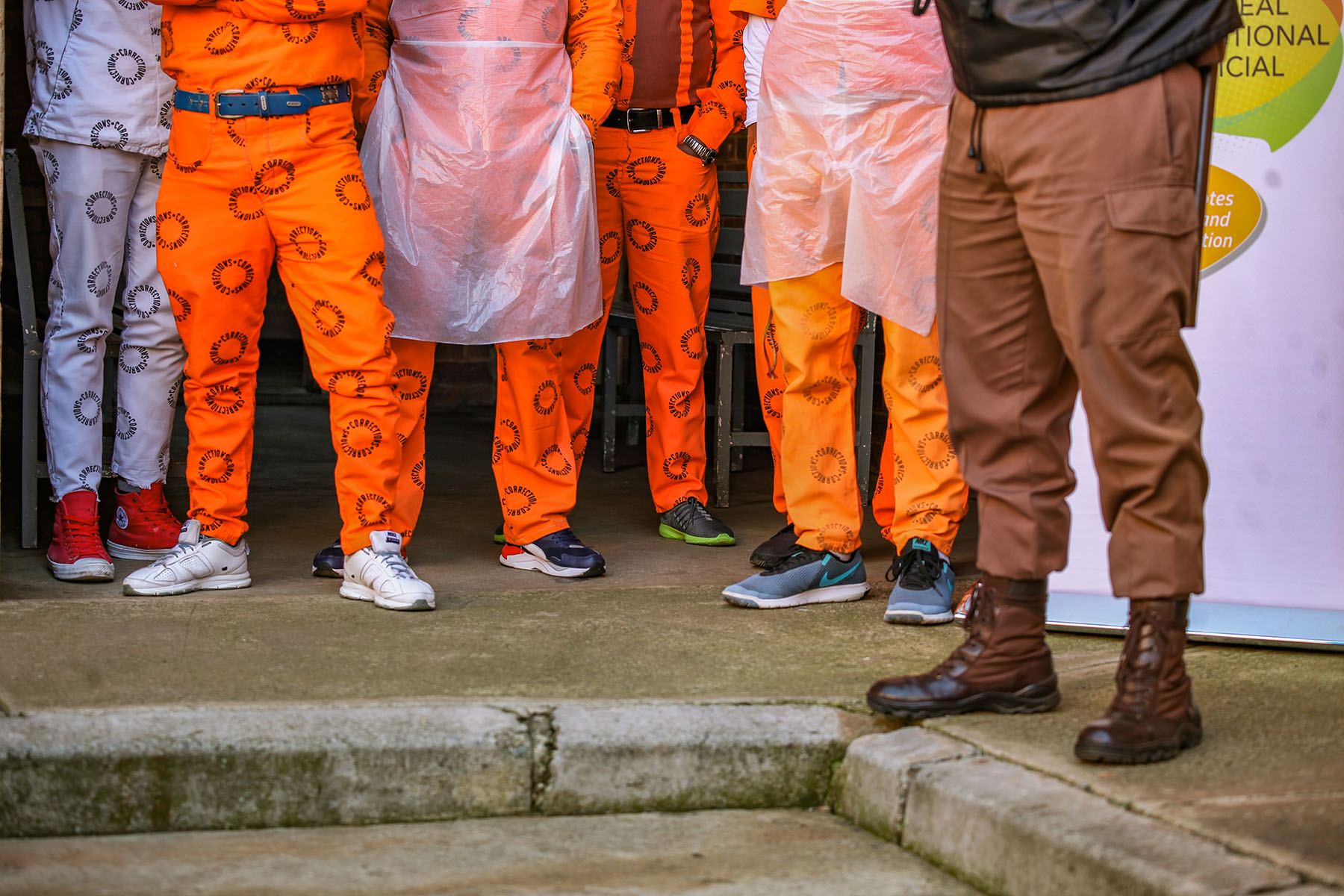
According to Safer Spaces (a knowledge hub), prison conditions in South Africa are dire. This includes poor ventilation, inadequate facilities, lack of privacy, and insufficient healthcare. Many inmates become victims of sexual violence, and diseases like HIV and Tuberculosis spread at much higher rates than in the general population.
Unfortunately, this environment and a lack of funding also negatively impact the success of rehabilitation programs, which, in turn, leads to a higher rate of reoffending.
Juvenile and youth centers
In South Africa, the Child Justice Act holds children accountable for crimes from age 10, but between 10 and 14, they can only be arrested if their culpability is proven. Youths aged 14 to 18 can be arrested, prosecuted, and sentenced to juvenile correctional facilities, prioritizing rehabilitation and education.
These institutions offer structured environments with schooling and vocational training. However, they face challenges similar to adult prisons, such as overcrowding and limited resources, affecting their effectiveness.
Prison authorities separate young inmates under the age of 25 into the following groups:
- Children (minors): younger than 18
- Juvenile: 18–21
- Youth: 22–25
Women in prison
According to the latest (2022) Judicial Inspectorate for Correctional Services (JICS), female prisoners comprise about 3% (around 4,600) of the incarcerated population in South Africa.
Women are housed in separate facilities within large prison complexes or specific units. Only female officers are allowed to conduct a personal search.
Although pregnant prisoners receive maternity services, they often lack access to other preventative screenings or specialist medical care for women. Typically, mothers-to-be can give birth at an external health facility, and their babies may remain with them up to the age of two.
LGBTQIA+ inmates
Transgender prisoners are typically housed according to their biological sex, but they have the option to request separate transportation and placement in secure care units.
Unfortunately, many choose not to disclose their status due to fear of discrimination and violence.
Legally, prison administrations are obligated to establish gender-sensitive environments and ensure LGBTQIA+ inmates’ safety from violence, rape, and harassment. However, consistent implementation of these measures may be hindered by issues such as overcrowding and a lack of training and understanding among correctional officers regarding LGBTQIA+ needs.
Prisoners with disabilities
Untried prisoners with disabilities may be held separately in cells for their safety and to meet their specific needs.
However, despite the law stipulating that the prison administration must accommodate disabled prisoners through planning, policy, and infrastructure, most facilities have insufficient modifications, such as handrails or ramps.
Your rights if you are arrested in South Africa
Deportations are predominantly aimed at undocumented immigrants.
In South Africa, the rights of individuals who are arrested are protected under the Constitution, particularly in the Bill of Rights, such as:
- Right to remain silent and be informed of the charges
- Right to contact family, friend, or legal counsel
- Right to legal representation and a fair trial
- Right to bail (except in severe cases)
- Right to be free from violence, torture, and intimidation while in custody
- Right to adequate accommodation, nutrition, medical treatment, and reading material
- Right to challenge the lawfulness of the detention
- Right to be released within 48 hours if not arrested or appear in front of a judge (if it falls outside court hours, this may be extended)
These rights also apply to incarcerated persons in South Africa. As such, Section 35 of the Constitution safeguards the prisoners’ rights, guaranteeing fair treatment, the right to challenge detention, consult legal advisors, and receive medical care when needed.
Those unable to afford legal representation (e.g., prisoners) can access assistance through Legal Aid South Africa. Alternatively, you can use pro bono legal services coordinated by the Legal Practice Council. Some lawyers may handle civil lawsuits on a contingency basis. This means they provide services without upfront fees and only get paid if the case is successful.
Filing an appeal
The appeal process may differ slightly depending on the court ruling on your case. Therefore, it is best to seek legal counsel when you file an appeal against the lawfulness of detention or dispute a verdict.
Generally, you will follow these steps:
- File a Notice of Appeal with the relevant court within 20 days after the ruling
- Clearly outline your reasons for the appeal (e.g., legal errors, unfair detention, procedural matters)
- Submit the appeal with supporting documents, evidence, and transcripts
- Once the court receives your appeal, it will set a date for the hearing with a higher court
- Following the hearing, the appellate court will decide whether to confirm, amend, or overturn the original judgment. If dissatisfied, further appeal options may be available, particularly if new evidence emerges or a significant legal issue arises.
Legal rights for foreigners
In South Africa, foreign citizens, immigrants, and locals are equal before the law. For example, you have the right to contact family, appeal the lawfulness of your detention or sentence, have a fair trial with legal representation, and be treated with dignity when detained.
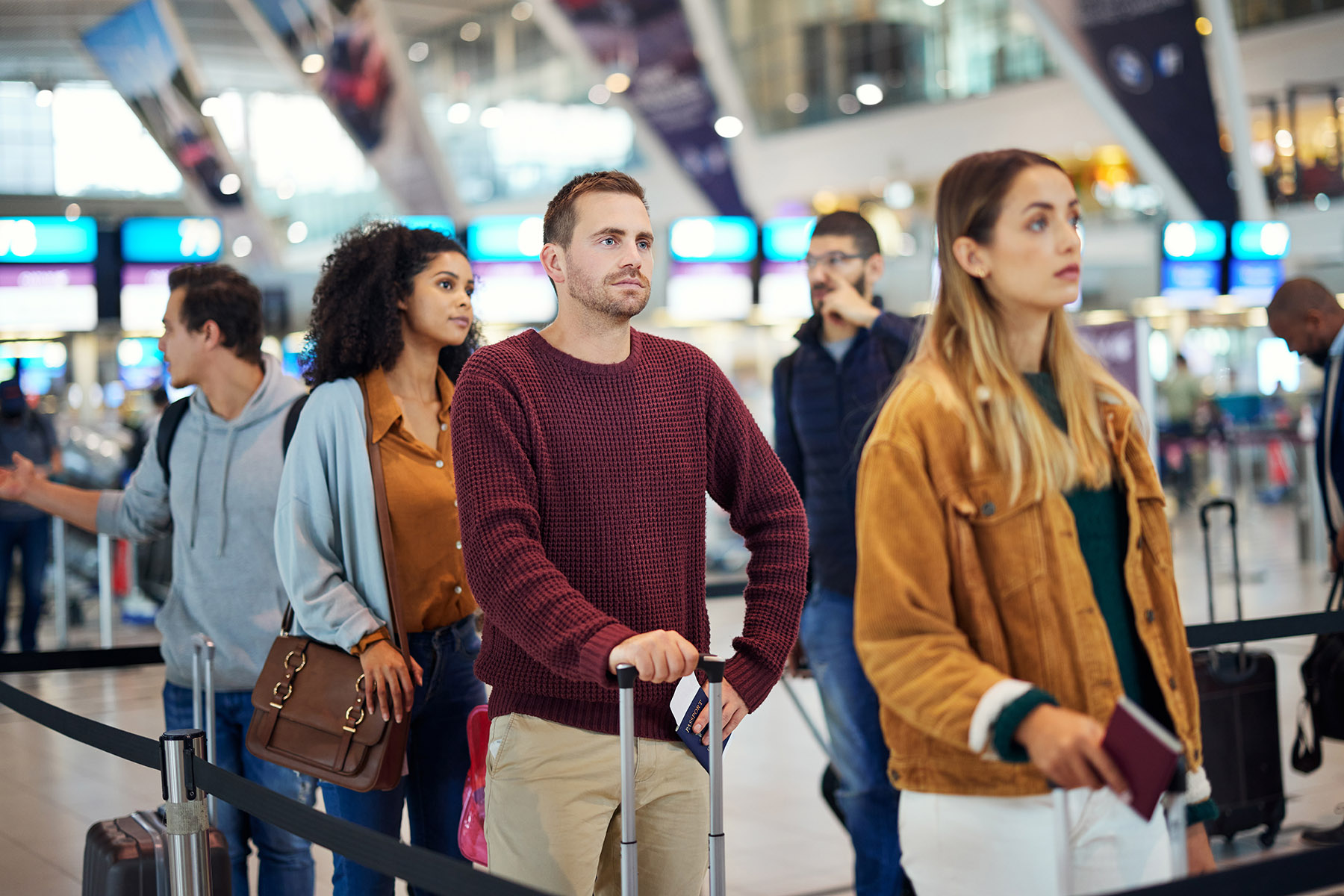
However, foreign residents must follow immigration rules. Otherwise, they can be arrested or deported. Still, the authorities must abide by the Bill of Rights, whichever legal action they take. For example, if returning someone to their home country puts them at risk of death or persecution, by law, South Africa cannot send them back as it undermines their human rights. As such, people seeking asylum or refugees have special protections based on the principle of non-refoulement.
Extradition treaties
Extradition treaties between South Africa and other countries specify eligible serious crimes, such as murder, fraud, or corruption, and outline the legal procedures, including evidence requirements.
However, as mentioned before, extradition may be refused if there’s a risk of the individual facing the death penalty upon return to their home country.
South Africa’s extradition network includes numerous bilateral treaties, such as the following:
- Extradition agreements
- Algeria
- Australia
- Botswana
- Canada
- China
- Egypt
- India
- Israel
- Lesotho
- Malawi
- Nigeria
- Swaziland
- Arab United Emirates (UAE)
- United States
- Agreement needs to be ratified
- Argentina
- Hong Kong
- Agreement negotiated, not yet signed
- Brazil
- Cuba
- Hungary
- Mexico
- Namibia
- South Korea
- Taiwan
South Africa’s accession to the European Convention on Extradition of 1957 further expands its extradition agreements to over 50 states.
Useful resources
- Bill of Rights – civil and human rights based on the Constitution of South Africa
- South African Police Service (SAPS) – official website with resources and detailed information
- Police Recorded Crime Statistics – official crime stats for 2022/2023 as recorded by the SAPS
- Law Library – access to the digital law library of South Africa
- Legal Mind – academic articles on the South African legal system, laws, and court cases
- Governance, Public Safety, and Justice Survey (GPSJS) – a victim of crime report by Statistics South Africa (StatsSA) for 2022/2023
- Domestic Violence Act (1998) – amendments to the act to increase the protection of survivors
- Rape Crisis – a counseling and resource service for survivors of sexual violence
- Crimes against women in South Africa – an analysis of GBV and femicide compiled by Stats SA
- Afrobarometer – the findings from a survey on GBV in South Africa
- Immigration Act (2002) – official information about immigration laws
- Refugees Act (1998) – official information about refugee policy
